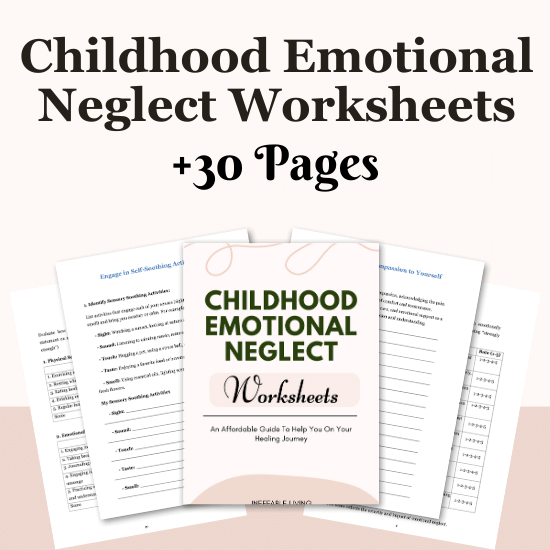This post contains the best tips on recovering from emotionally immature parents.
Who Are The Emotionally Immature Parents?
Emotionally immature parents can encompass a range of individuals who demonstrate challenges in effectively managing their emotions, communicating with empathy, and navigating interpersonal relationships in a healthy and balanced manner.
It’s important to note that emotional immaturity is not a clinical diagnosis but rather a description of behaviors and traits that can impact parenting and familial dynamics.
Signs of Emotionally Immature Parents
Here are some common signs of emotionally immature parenting:
1. Emotional Volatility
– Emotionally immature parents may exhibit unpredictable mood swings, intense emotional reactions, or difficulty regulating their own emotions, creating an unstable environment for their children.
2. Lack of Boundaries
– Parents who struggle with emotional immaturity may have difficulty setting and respecting appropriate boundaries, leading to enmeshment, over-involvement in their children’s lives, or a lack of personal space and autonomy.
3. Inconsistent Parenting
– Emotionally immature parents may struggle to maintain consistent rules, consequences, and parenting styles, leading to confusion and insecurity for their children.
4. Need for Validation
– Parents with emotional immaturity may seek excessive validation and reassurance from their children, placing undue emotional responsibility on them and hindering the development of healthy parent-child boundaries.
Related: Emotionally Unavailable Parents Test (+FREE Worksheets)
5. Difficulty with Empathy
– Emotionally immature parents may struggle to empathize with their children’s emotions or perspectives, minimizing their feelings or failing to provide appropriate support and validation.
6. Avoidance of Responsibility
– Parents who are emotionally immature may avoid taking responsibility for their actions, leading to a lack of accountability and inconsistent or unfair treatment of their children.
7. Dependency on Children
– Emotionally immature parents may rely on their children for emotional support, validation, or companionship, reversing the typical parent-child dynamic and placing undue burdens on the children.
Related: Top 8 Dysfunctional Family Roles
8. Inability to Handle Stress
– Parents with emotional immaturity may struggle to cope with stress or adversity, leading to erratic or disproportionate reactions that can impact the family environment.
9. Manipulative Behavior
– Emotionally immature parents may engage in manipulative behaviors, such as guilt-tripping, gaslighting, or using emotional coercion to influence their children’s thoughts and actions.
10. Lack of Emotional Regulation
– Parents who are emotionally immature may demonstrate poor emotional self-regulation, exhibiting anger outbursts, passive-aggressive behavior, or emotional withdrawal in response to stressors.
Related: Healing From Childhood Emotional Neglect In 6 Steps (+FREE Worksheets PDF)
11. Role Reversal
– Emotionally immature parents may inadvertently or intentionally place their children in roles typically reserved for adults, such as confidante, caregiver, or mediator in family conflicts.
12. Self-Centeredness
– Emotionally immature parents may prioritize their own needs and desires over those of their children, leading to neglect of the children’s emotional well-being and healthy development.
13. Limited Emotional Expression
– Parents who are emotionally immature may struggle to express a wide range of emotions or provide nurturing and supportive responses to their children’s emotional needs.
14. Unresolved Trauma and Wounds
– Emotionally immature parents may carry their own unresolved emotional trauma or wounds from their own upbringing, affecting their ability to provide a secure and stable environment for their children.
15. Difficulty Navigating Conflict
– Parents with emotional immaturity may struggle to navigate conflict in a constructive manner, leading to frequent arguments, unresolved disputes, or emotional tension within the family.
Related: Best 5 Books For Childhood Emotional Neglect
Best 10 Tips On Recovering From Emotionally Immature Parents
Recovering from the impact of having emotionally immature parents can be a challenging and complex journey.
The experiences, behaviors, and dynamics within the family unit can significantly shape an individual’s emotional well-being, self-esteem, and interpersonal relationships.
Here are some tips to support the recovery process:
1. Self-Compassion and Validation
Recognize and validate your emotions and experiences.
It’s essential to acknowledge that the impact of emotionally immature parents is real and valid.
Practice self-compassion by treating yourself with kindness and understanding.
2. Seek Understanding
Educate yourself about emotional immaturity and its effects.
Understanding the patterns and dynamics within your family can provide clarity and help you make sense of your experiences.
Related: Top 10 Signs You Grew Up In A Toxic Family
3. Set Boundaries
Establish healthy boundaries to protect yourself from ongoing negative interactions or emotional triggers.
Boundaries can include limiting contact, setting clear communication guidelines, and asserting your needs.
4. Heal Your Inner Child
Engage in inner child work to address and heal the wounds carried from childhood.
This involves nurturing your inner child, validating their feelings, and providing the care and understanding that may have been lacking in your upbringing.
Write a compassionate letter to your inner child, acknowledging their experiences, expressing love and empathy, and offering reassurance and support.
This exercise can provide a sense of validation and acknowledgment for the emotions and needs of your inner child.
Related: What Happens When The Scapegoat Fights Back?
5. Develop Emotional Awareness
Cultivate awareness of your own emotions and how they influence your thoughts and behaviors.
Mindfulness practices and emotional awareness exercises can help you gain insight into your emotional responses.
Here’s a simple mindfulness exercise:
- Find a comfortable and quiet space where you can sit or lie down without distractions. Close your eyes gently, allowing yourself to settle into a relaxed position.
- Begin by bringing your attention to your breath. Notice the natural flow of your breath as it moves in and out of your body.
- As you focus on your breath, pay attention to any emotions that may be present within you. Without trying to change anything, simply observe the quality of your emotions. Are they calm, agitated, or neutral?
- Notice any physical sensations that accompany your emotions. Are there any areas of tension or relaxation in your body? Observe these sensations with gentle curiosity.
- As you continue to breathe mindfully, acknowledge any thoughts that arise without becoming entangled in their content. Simply notice them as passing mental events.
- If it feels comfortable, you can silently label the emotions you’re experiencing. For example, “This is calmness,” “This is anxiety,” or “This is contentment.” Naming the emotions can bring clarity and acknowledgment.
- When you’re ready to conclude the exercise, take a few more deep breaths, gradually transitioning back to your surroundings. Open your eyes and carry the sense of emotional awareness and presence with you as you move forward with your day.
6. Build Supportive Relationships
Surround yourself with supportive and understanding individuals who can provide validation, empathy, and healthy relationship dynamics.
Cultivating a strong support network can be immensely beneficial in the healing process.
Related: Adult Child Syndrome: 3 Steps To Break Family Cycles
7. Address Self-Esteem Issues
Work on building self-esteem by practicing self-care, setting achievable goals, and recognizing your strengths and accomplishments.
Challenging negative self-perceptions and internalized messages is crucial.
8. Emotional Regulation Skills
Learn and practice emotional regulation techniques to manage intense emotions and cultivate a sense of stability.
Deep breathing, grounding exercises, and mindfulness practices can be helpful.
Explore and adopt healthy coping mechanisms such as journaling, creative expression, physical activities, or engaging in hobbies that bring you joy and fulfillment.
Related: Top 18 Self Esteem Exercises (+FREE CBT For Self-Esteem Worksheets PDF)
9. Reparenting Yourself
Engage in reparenting exercises to provide yourself with the care and nurturing you may have missed in childhood.
This involves self-soothing, self-validation, and creating a supportive inner dialogue.
10. Assertive Communication
Learn and practice assertive communication skills to express your needs, set boundaries, and navigate interpersonal relationships in a healthy and respectful manner.
11. Grieve What Was Missing
Allow yourself to grieve the nurturing, validation, and support that may have been absent in your upbringing.
Acknowledge the losses and work towards finding healing and restoration in your current life.
12. Explore Your Authentic Self
Take the time to explore and reconnect with your authentic self.
Identifying your values, interests, and personal aspirations outside of familial expectations is a valuable part of the healing journey.
Here are some prompts:
- What are the core values that are most important to you in your life? How do these values influence your decisions, actions, and relationships?
- Reflect on your unique strengths, talents, and capabilities. What are the qualities that set you apart and contribute to your sense of personal identity and worth?
- Explore the activities, hobbies, or topics that ignite a sense of passion and joy within you. What pursuits bring you a deep sense of fulfillment and purpose?
- Consider your long-term goals, dreams, and aspirations. What would you like to achieve or experience in different areas of your life, such as career, relationships, personal growth, and contribution to the world?
- Acknowledge the challenges and obstacles you have faced in your life. How have these experiences shaped your character and resilience? What have you learned from overcoming adversity?
- Reflect on your emotional experiences and patterns. What are the primary emotions that you frequently encounter? How do you typically respond to these emotions, and what coping strategies do you employ?
- Explore your sense of identity, including aspects such as cultural background, gender, sexuality, and personal beliefs. How do these facets contribute to your overall self-image and perceptions of the world?
- Consider your relationships with others, including family, friends, romantic partners, and colleagues. What do these relationships reveal about your communication style, boundaries, and needs for connection?
- Evaluate your self-care practices and habits. How do you prioritize your physical, emotional, and mental well-being? What activities nourish and replenish your energy?
- Contemplate the deeper meaning and purpose that guide your life. What gives your existence significance, and how do you seek to contribute to the greater good?
13. Addressing Shame and Guilt
Work on addressing any feelings of shame or guilt that may have arisen from your upbringing.
Reframing these emotions and recognizing their origins can be freeing.
Recognize that the emotional unavailability of your parents was not your fault.
Children are not responsible for the emotional capacity of their caregivers.
By reframing this narrative, you can release yourself from unjustified guilt and shame.
Related: Best 20 Healing Shame Exercises To Break Free From Toxic Shame
14. Forgiveness and Letting Go
Consider exploring forgiveness as a means of releasing resentment and allowing yourself to move forward.
This can be a gradual and deeply personal process.

Conclusion
Recovering from the impact of emotionally immature parents is a significant and ongoing process.
It’s essential to approach this journey with patience, self-compassion, and a commitment to personal growth.
Remember that healing is possible.



